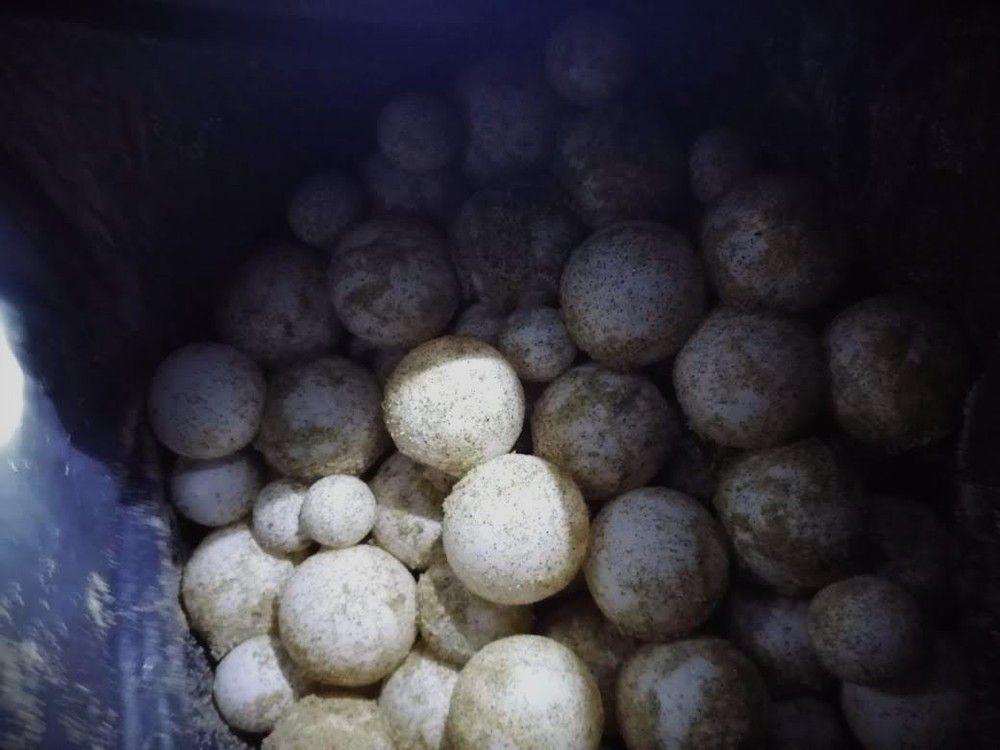On October nights, with a bright moon, about 20 sea turtles of the Golfina species (Lepidochelys olivacea) come out daily to the sandy beaches of La Barra de Santa María Colotepec, Oaxaca, to lay their eggs.
Buried at more than 40 centimeters, they should hatch in a period of approximately 50 days, to fulfill the reproduction cycle of this critically endangered species, according to the Red List of the International Union for Conservation of Nature.
But the reproduction cycle does not close. As soon as the turtles lay their eggs, a group of people extract as many as they can. They are known as “eggshells” or “predators”.
Sergio Ordaz, a member of the Bocabarra Community Camp in Colotepec, said that sometimes more than half of the nests are stolen, each containing between 90 and 120 eggs.
“Sometimes we have 20 or 30 nests in one night, and of those rescues sometimes 10, sometimes 15. The rest is taken by predators,” he told Journalism CN.
Trafficking in turtle eggs has been common off the coast of Oaxaca for decades, but the economic crisis resulting from the Covid-19 pandemic aggravated the situation.
In the case of Santa María Colotepec, Ordaz explains, some eggs are distributed locally, but most of the illegal commercialization along the coast of Oaxaca ends up in the Juchitán market, in the Isthmus region.
There it is common to find eggs for sale or dishes prepared with them. When supply is high, the price is even lower than that of farm-produced chicken eggs.
The waters of the Mexican Pacific are one of the territories with the highest abundance of dolphin turtles in the world, in particular the coastal area of Michoacán and Oaxaca, in accordance with the Program of Action for the Conservation of the Species, prepared by the Secretariat of Environment and Natural Resources (Semarnat).
It is under permanent ban. Its capture is prohibited, as is its use and the extraction of its eggs, even for self-consumption, in accordance with the provisions of the Official Mexican Standard 059-Semarnat-2010.
However, the authority is absent in the area, says the activist. The Federal Attorney's Office for Environmental Protection (Profepa), an institution responsible for inspecting and punishing environmental crimes, has practically no presence in the area, while the municipal police show up sporadically.
“Then they are told, 'Look they come because the predators are walking', and well, many times they do come, but well, I don't like to do the swerves constantly, they don't walk, they come to the beach, they keep looking one way and the other and then they leave. The predators just hide for a while and then come out again,” he said in an interview.
Using the body to defend the turtles
Sergio Ordaz engages in coastal fishing during the day. At night, it makes rounds to protect turtle eggs during the season from July to January. When he manages to win a nest from the “egg cups”, he takes them out and takes them to a safe pen.
The Bocabarra Community Camp in Colotepec, he recalled, was founded just over nine years ago, when the community was threatened by the possible privatization of the beach where they go fishing. The fishermen organized themselves and, since then, they have focused on taking care of the turtles that reach these areas.
However, they are repeatedly confronted with attacks from illegal egg traders.
“They don't like us being there, then they want to hit you, but we chose not to confront, we moved on. If you rescue two nests and go to the nesting pen, it's good, but yes, the danger is for those of us who monitor,” he said.
The camp has 30 people. They all work on a voluntary basis.
“It's our turn to two or three colleagues, and so on we do the monitoring, regardless of the work you have all day, at night, if you have to go to monitor, then you have to go,” Ordaz added.
In the early morning of April 23, 2019, a group of individuals —fully identified in the community—set fire to the camp and assaulted two men who were guarding the place. So far, those responsible have not been sanctioned, said Sergio Ordaz.
The importance of conserving
The Boca Barra camp releases around 3,000 baby turtles each season. According to the organization Oceana, the average survival of sea turtles is low, hence their critical situation on the planet: out of every thousand babies, only one reaches adulthood.
In addition to egg traffickers, turtles face other problems related to human activity.
One of the main ones is the disturbance of the beaches, with tourist infrastructure, lights and noise, said Gisela Maldonado Saldaña, a specialist in sea turtles. Also the modification of the physical conditions of the beaches, such as the compaction of dunes or the removal of vegetation.
Global warming is another phenomenon that works against it, since the destruction of habitats due to natural disasters or the modification of sand temperatures has repercussions on the reproduction of these species.



Comentarios (0)